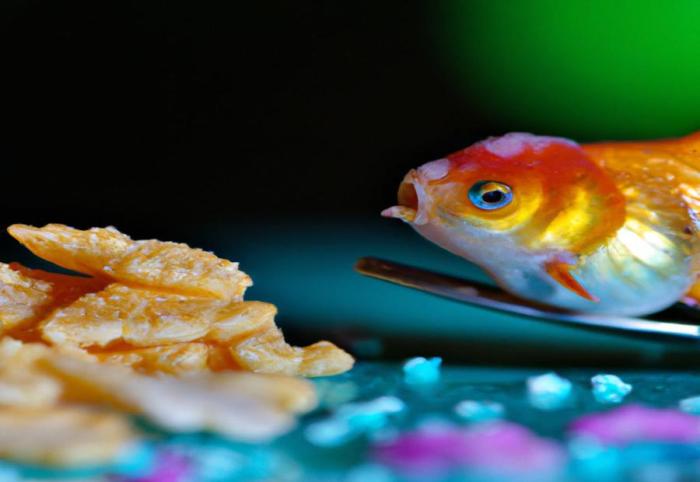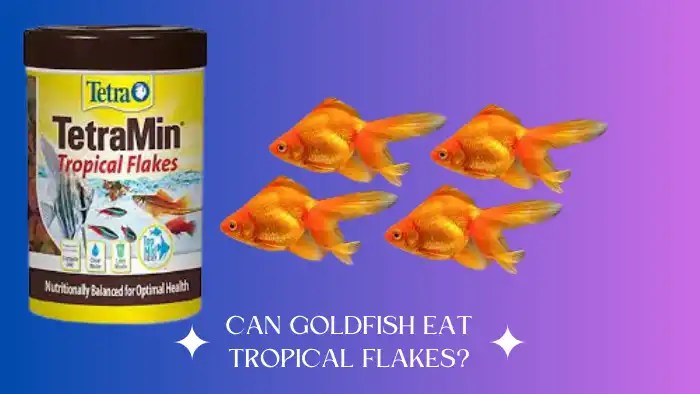Can goldfish eat tropical flakes? This question sparks debate among fish enthusiasts, as the answer isn’t a simple yes or no. While both goldfish and tropical fish are aquatic creatures, their dietary needs differ significantly. Goldfish, with their unique digestive systems, require a balanced diet rich in specific nutrients that may not be adequately supplied by tropical flake food.
Understanding the nutritional requirements of goldfish and the composition of tropical flakes is crucial for responsible fishkeeping. This article delves into the complexities of feeding goldfish, examining the potential benefits and drawbacks of tropical flakes and exploring alternative food options that cater to their specific needs.
Tropical Flake Composition
Tropical fish flakes are a common food choice for many aquarium owners, but their suitability for goldfish can be debated. These flakes are typically formulated for a variety of tropical fish species, which have different dietary needs than goldfish.
While goldfish can’t eat tropical flakes, which are designed for different fish species, their diet can be surprisingly varied. You might be surprised to learn that they can even enjoy the occasional nibble of celery, although it should always be offered in moderation.
Can goldfish eat celery ? The answer is yes, but remember that their primary food source should be high-quality fish flakes or pellets, not random vegetables.
Ingredient Analysis
Tropical fish flakes often contain a mixture of ingredients, including:
- Fish meal:A common source of protein, but it can be of variable quality and may contain high levels of phosphorus, which can be problematic for goldfish.
- Wheat flour:A filler ingredient that provides carbohydrates, but it can be low in nutritional value and may contribute to digestive issues.
- Soybean meal:Another source of protein, but it can be high in fat and may not be easily digestible by goldfish.
- Other ingredients:These can include various grains, vegetables, and supplements like vitamins and minerals. The specific ingredients and their proportions vary widely between brands.
Potential Benefits and Drawbacks
- Benefits:Tropical flakes can be a convenient and affordable food source for goldfish. They can provide some essential nutrients, such as protein and carbohydrates. However, these benefits are often outweighed by the potential drawbacks.
- Drawbacks:The high levels of phosphorus and low levels of fiber in many tropical flakes can be detrimental to goldfish. The high phosphorus content can contribute to swim bladder problems and kidney issues, while the lack of fiber can lead to constipation and digestive issues.
While goldfish can be fed tropical flakes, it’s important to remember that they are omnivores and benefit from a varied diet. This means incorporating live or frozen foods like can goldfish eat mealworms , which provide essential nutrients and enrichment.
Just as tropical flakes can’t be the sole source of nutrition for a goldfish, it’s important to avoid overfeeding any one type of food and offer a balanced diet to keep your goldfish healthy and happy.
Potential Risks of Feeding Tropical Flakes, Can goldfish eat tropical flakes
- Nutrient Imbalances:Tropical flakes are often formulated to meet the needs of a wide range of tropical fish species, but these needs may not align with the specific requirements of goldfish. This can lead to nutrient imbalances, such as an excess of phosphorus and a deficiency of essential vitamins and minerals.
- Digestive Issues:The high content of fillers and the lack of fiber in some tropical flakes can contribute to digestive issues in goldfish. This can manifest as constipation, bloating, and other problems.
Alternative Food Options for Goldfish

While tropical flakes are a convenient option for goldfish, a varied diet is crucial for their overall health and well-being. Goldfish, like other animals, benefit from a balanced and diverse diet. This can be achieved by incorporating a variety of food options, including live, frozen, and commercial alternatives to tropical flakes.
Alternative Food Options for Goldfish
A balanced diet for goldfish can be achieved by incorporating a variety of food options, including live, frozen, and commercial alternatives to tropical flakes.
| Food Type | Nutritional Benefits | Potential Drawbacks |
|---|---|---|
| Live Food |
|
|
| Frozen Food |
|
|
| Commercial Alternatives |
|
|
Sample Feeding Schedule for Goldfish
A sample feeding schedule for goldfish based on these alternative food options is provided below:
Daily:
- Commercial flakes or pellets (a small amount)
2-3 times per week:
- Live or frozen food (bloodworms, brine shrimp, daphnia)
Once per week:
- Sinking wafers (for bottom feeders)
Epilogue: Can Goldfish Eat Tropical Flakes

Feeding goldfish the right food is essential for their health and well-being. While tropical flakes may seem convenient, they can pose risks to goldfish due to nutrient imbalances and digestive issues. By understanding their dietary needs and exploring alternative food options, fishkeepers can ensure their goldfish thrive in a healthy and balanced environment.
Remember, responsible fishkeeping involves making informed choices that prioritize the health and happiness of your aquatic companions.
While goldfish can technically eat tropical flakes, their nutritional needs are different. Goldfish require a diet higher in protein and lower in carbohydrates than tropical fish. It’s important to consider their specific needs when choosing food. For a more detailed understanding of the compatibility of goldfish and tropical fish food, check out this article: can goldfish eat tropical fish food.
Ultimately, feeding goldfish a diet specifically designed for them is the best way to ensure their health and longevity.